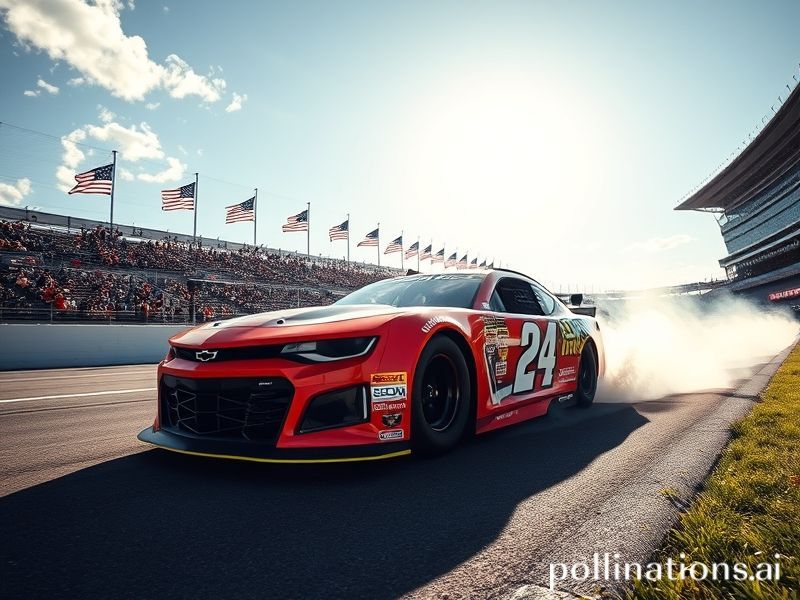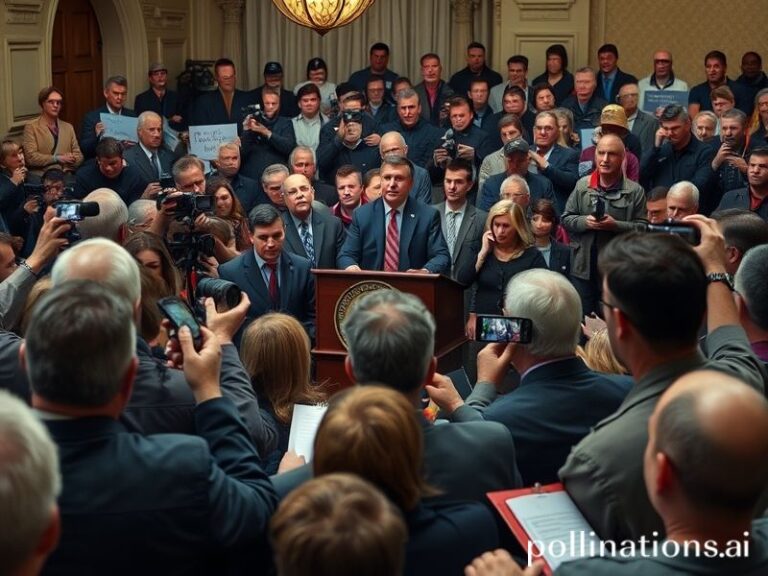Global Spin Cycle: How NASCAR Became the World’s Loudest Metaphor for Modern Chaos
The Eternal Oval: NASCAR’s Global Relevance in an Age of Electric Regret
By Dave’s Foreign Correspondent-at-Large, still jet-lagged in Charlotte
CHARLOTTE—Somewhere between the smell of burnt ethanol and the distant hum of a C-130 practicing touch-and-go at the nearby Air National Guard base, it dawned on me that NASCAR is either the last honest religion in America or the most expensive metaphor for late-stage capitalism ever devised. From the outside—say, a café terrace in Lisbon or a bullet-train barreling past Mount Fuji—the sight of 40 highly caffeinated stock cars hurtling around an asphalt loop at 200 mph looks like a nation’s collective midlife crisis playing out in real time, complete with corporate livery and a souvenir stand.
Internationally, the series is often dismissed as loud oval provincialism, the sporting equivalent of deep-fried butter on a stick. But that diagnosis misses the point. In 2024, when European parliaments debate 15-minute cities and Singapore taxes you for exhaling too much carbon, NASCAR’s commitment to going nowhere fast is less anachronistic than it is subversive. It’s a 500-mile meditation on the human condition: we know the route, we know the destination, yet we still floor it—sponsored, naturally, by a crypto exchange currently under SEC investigation.
The global implications are subtler than the roar suggests. Consider the drivers: a Colombian, a Mexican, and a Venezuelan walk into a bar in Alabama, and nobody blinks because they’re all wearing the same fire suit. Meanwhile, the manufacturers—Toyota, Chevrolet, Ford—play an arms race of aerodynamic tweaks, each trying to convince Beijing, Berlin, and Brasília that their pushrod V8 technology is somehow “relevant” to the hybrid crossover you’ll lease next year. It’s marketing as geopolitical theater, staged at 3,000 RPM.
Then there’s the broadcast footprint. NASCAR’s media rights—freshly renegotiated for enough cash to prop up a medium-sized NATO member—now reach 190 countries, mostly at ungodly hours. In Seoul, bleary-eyed hedge-fund analysts treat the Daytona 500 as a liquidity bellwether: if the lead pack stays single-file, risk-on; if they wreck early, buy yen. In Lagos, bootleg streams overlay Nigerian pidgin commentary over Mike Joy’s play-by-play, turning stage breaks into impromptu economics seminars on fuel-mileage arbitrage.
And don’t overlook the supply chain. Those carbon-fiber splitters? Woven in Japan. The Goodyear Eagles? Molded in Luxembourg, cured in Akron, blessed by a priest in Akron (only half joking). Even the ethanol blend—15 percent corn liquor, 85 percent existential dread—owes its existence to Iowa caucus math. A single race car is a rolling Gantt chart of global trade tensions, assembled by underpaid temp workers who dream of dental coverage.
Which brings us to the existential bit. Formula 1 has Netflix and carbon-neutral pledges; Formula E has, well, batteries and the faint smell of smugness. NASCAR has chosen a different path: full-throttle denial wrapped in the flag and a soft-serve helmet. The sport’s new hybrid engine—arriving in 2027 like a guilty afterthought—will still be loud enough to drown out the climate anxiety of its mostly suburban audience. Call it cognitive dissonance on 93 octane.
Yet there’s a strange nobility in the refusal to evolve too quickly. While the rest of the planet agonizes over ESG scores and Scope 3 emissions, NASCAR doubles down on the medieval pageantry of noise, beer, and conspicuous combustion. It’s as if the entire enterprise took one look at the Anthropocene and said, “Hold my Mountain Dew.” There’s comfort in that honesty; at least no one’s pretending the grandstands are powered by fairy dust and good intentions.
So when the lights dim at Charlotte Motor Speedway and 80,000 souls rise for the invocation—a prayer that somehow thanks both Jesus and Sunoco—remember that this isn’t just America’s pastime. It’s a planetary ritual, an absurdist opera in four turns. The world may be hurtling toward heat death, but for three hours on a Sunday, humanity agrees to chase itself in circles, sponsored by the same corporations promising to save us. And in that loop, if you squint past the tire smoke, you can glimpse the whole tragic comedy of the species: restless, noisy, and stubbornly convinced the next lap will be different.







